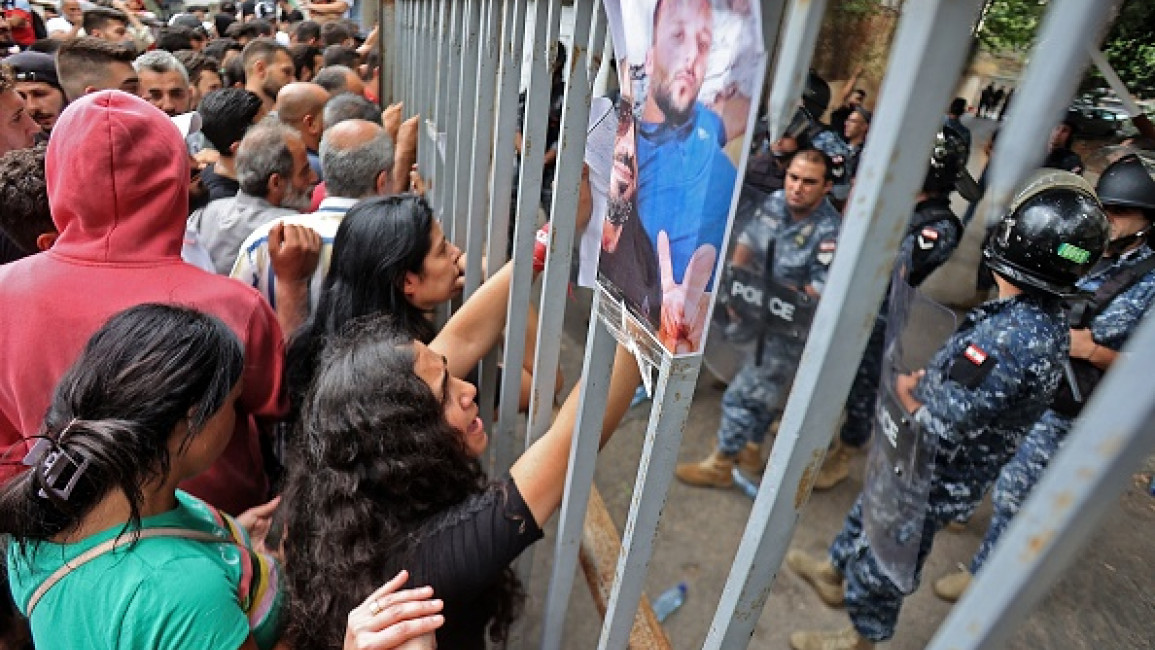Explainer: What consequences will Lebanon’s ‘bank heroes’ face?
In the last two weeks, more than ten individuals have held up banks in Lebanon, seeking to free their deposits from the country’s ailing banking sector.
Some of the individuals who held up the banks were taken into custody by the authorities, while others – such as Sali Hafez – are currently in hiding.
These were not your average bank robberies.
To start, these bank "robbers" were not looking to steal anybody's money. Instead, they were looking to access their deposits, which were frozen by banks in the wake of Lebanon's 2019 financial crisis without any legal basis for the asset freeze.
The Lebanese legal system, in turn, has struggled to deal with depositors who have decided to take matters into their own hands.
Will the depositors face charges?
To date, no depositors who have held up banks have faced any legal consequences.
In January, Abdullah al-Saei, who held up a bank in the Bekaa valley with a gun, was arrested by Lebanese security forces. He was shortly released after, with no charges filed against him.
Mohammed Beydoun, who occupied a bank alongside supporters in June 2021, was initially charged with assaulting bank staff but was also eventually allowed to walk free.
After the spate of hold-ups on 16 September, the Lebanese Banking Association (ABL) released a statement warning that it reserved the right to "take any measures necessary" to protect the "safety of its employees."
"The banks have already tried to punish the depositors by trying to file lawsuits against them because there needs to be a direct charge from the bank or its employees," Dina Abu Zour, a lawyer with the Depositor's Union, told The New Arab.
Their efforts to charge depositors who have taken their money by force are hindered by the fact that the banks' strict withdrawal limits have no basis in Lebanese law.
When other countries have had financial crises, they have adopted capital controls to prevent a run on the banks and stop money from being taken out of the country. In 2019, Argentina imposed capital controls, for example, to stem foreign exchange shortages.
Lebanon has struggled to do the same, with Parliament failing to pass a capital control law three years after the start of its economic death spiral. The IMF has warned that it will not give a bailout until controls are adopted, but Lebanon's lawmakers have still not managed to agree on the contents of a control law.
As a result, the informal capital controls imposed by Lebanese banks – including the freezing of deposits – cannot be enforced by Lebanon's courts.
Instead, it is expected that Lebanese authorities will try to charge the individuals who held up banks with Article 429 of the Lebanese Penal Code, "securing your rights by force."
"We don't think it is robbery as they are trying to depict it, so we think this is the only logical [charge]. This is what they tried to charge al-Saei with," Abu Zour said.
Besides the legal challenges of charging depositors, authorities have to contend with public opinion.
Those who held up banks, especially Sali Hafez and Bassam al-Sheikh, have become veritable heroes in Lebanon.
After two of the activists who assisted Hafez in holding up a bank were arrested and charges were brought against them, protests followed. Protesters demonstrated outside Beirut's Palace of Justice, attracting waves of local media attention.
Activists have said that this popular support for these individuals and their acts of civil disobedience have given courts pause in sentencing those who have held up banks.
Collective punishment
After the string of hold-ups, the ABL announced that it would close banks for three days – later extending the closure indefinitely. It apologised to its customers for the "inconvenience" but said its closure would continue until it could guarantee the safety of its staff.
According to Abu Zour, this amounts to "collective punishment" backed by the banking and political classes.
"The actions of ABL are complete blackmail. They know depositors, especially small and medium depositors, have their salaries in banks and need to withdraw. This is illegal, unlawful and affects every cycle of Lebanon's economy," Abu Zour said.
Even as the banks have been closed to customers, banking staff have still been going to work.
Lebanon's Sayrafa platform, which allows for the purchase of foreign exchange and Lebanese Lira, has registered US$121 million in volume exchanged between 19 and 22 September. This is despite the bank closure, which started on 19 September.
This indicates that the closure only applies to medium and small depositors, Abu Zour said.


![President Pezeshkian has denounced Israel's attacks on Lebanon [Getty]](/sites/default/files/styles/image_684x385/public/2173482924.jpeg?h=a5f2f23a&itok=q3evVtko)



 Follow the Middle East's top stories in English at The New Arab on Google News
Follow the Middle East's top stories in English at The New Arab on Google News


